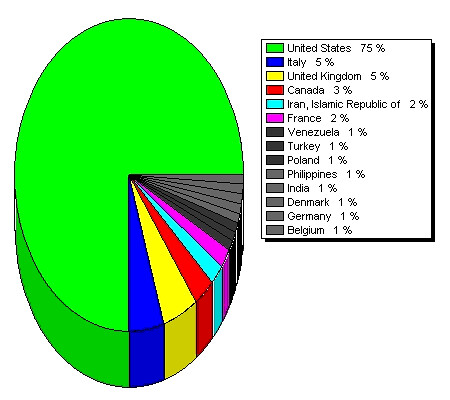
River Vices was born into the blogosphere in July of 2004, but I did not install a counter until six months later, on December 12th, 2004. I thought I would, on the occasion of this informal and otherwise unimportant anniversary, try to explain how this blog began, who and how many might be reading it, and where it might be heading.
But first the name. I chose River Vices as an ironic revision of River Voices, the name of the dvd documentary on the Portsmouth flood of 1937, produced by my Shawnee State colleague John Lorentz and his son Nathan. I had thought one of the first blogs I was going to write would be a deconstruction of the ideology of River Voices, but a year and a half later it is still undeconstructed. Less directly, the name River Vices owes something to Herman Melville's bitter novel The Confidence Man, about a riverboat con artist, in his various guises, and about an America that had become degraded by a hucksterist riverfront mentality.
How did I come to take a corrupt river town as the subject for a blog? For almost fifteen years I was deeply involved at Shawnee State University, especially in the affairs of the faculty union, the Shawnee Education Association, which I served as president for four terms. I was also managing editor of and wrote for the union newsletter, SEAView. I also wrote several articles on the shenanigans at the university in the Shawnee Sentinel, a newspaper started by students who were disturbed by the way in which some trustees and administrators acted as if SSU was just another of the pork-barrel projects that Portsmouth's over-privileged had come to think of as their private preserve.
Though I was deeply involved in the political life of the university for fifteen years, I cannot believe, looking back now, how little I knew about Portsmouth, the city the university was located in. What changed that was digital technology. As an English professor, I had come to feel that teaching most SSU students how to write essays was an exercise in futility. In culturally deprived families (which is to say in most American families) television has served as a babysitter for successive generations of American children, so it is not their fault that many of them, used to being entertained by Saturday morning cartoons, MTV, Walkmans and Ipods, find reading and writing as unnatural and difficult as walking on their hands. They are further disadvantaged by having the attention span of a fly as a result of having seen, in their formative years, 20,000 60-second commercials. I had come to feel that if they could learn how to create visual essays, with video cameras, they might understand that the same creative and editing skills needed to make a video essay were also needed to write a composition. I wanted to turn their cultrual disadvantages to their advantage.
But before I could teach students how to create essays with a digital camera, I had to learn how to do it myself. To help me learn, I chose as the subject for a video essay the political recall process that was going on in Portsmouth, focusing on the recall of the mayor in particular. When I started work on my video essay The Recall of Mayor Bauer, I had little knowledge of videography and even less of Portsmouth politics. I had no opinions about the elected city officials who were facing recall. Starting out, I assumed I was making a documentary, but even before I was finished I was persuaded by the “recallers” that Portsmouth city government was flagrantly corrupt. One of the persistent metaphors in Recall of Mayor Bauer and in River Vices has been prostitution, but I feel guilty about resorting to it because I know those hard-working and abused women on John St. do not deserve to be insulted by being compared with the crooked Portsmouth politicians and their over-privileged patrons.
I was all too familiar with the way in which the university was in the control of local politicians and the over-privileged, who were largely responsible for its poor academic reputation, but I had not understood how much the university was integrated in to and a reflection of the political corruption of the city and county, and to some extent of the state, government. What made the corruption so pervasive was that it was bi-partisan. Yes, Republicans predominated in southern Ohio, but only because the relatively few Democrats in public office played ball with them. At the local level, party affiliation is not important. If Portsmouth is typical, a popular aphorism should be revised to say, “All politics is local and all local politics is corrupt.”
River Vices was my attempt to use the new internet technology to write regularly about the political corruption of Portsmouth. Mark Twain was one of my inspirations for the undertaking. Not long after getting underway, I discovered another inspiration for sustaining it: the conservative Republican author, Jesse Stuart. What Stuart helped me understand, especially in his best novel Taps for Private Tussie, is how much government pork has corrupted the region.In his novels at least, Stuart was not sentimental or politically correct about Appalachian culture. You can take the people out of the hills, but you can't take the hills out of the people. If competition is a key to explaining the American character, (and I’m not sure that it is) don’t look for evidence of initiative in southern Ohio. With the departure of major manufacturing and industry from Portsmouth beginning over a half century ago, the politically shrewd realized that under the banner of the War on Poverty the government could be milked for many millions, much of which went into the pockets not of the poor but of the over-privileged of Portsmouth. Instead of initiative and enterprise, the traits that flourished were connivance and cover up, cover up of the corruption of local government, and cover up of the incompetence that the lack of competition has resulted in. Corruption and cover up are by now so deeply ingrained in the local culture that I can believe a political revolution could occur at the national and perhaps even state level and Portsmouth would hardly be affected by it.

Geographical Distribution of River Vices Readers
Over 20,000 hits have been recorded on River Vices in the past twelve months. River Vices now gets anywhere from 600 to 900 hits a week, and growing, so the numberof hits may be 40,000 next year. I know I have appreciative readers in Scioto County, because I have met some of them through chance encounters. But I have been surprised at how many River Vices readers are out of southern Ohio and how many, about 25%, in any given week, are outside of the United States. It may be, given the word “vices” in the name of the blog, that international surfers are expecting something other than southern Ohio politics. But the 2% in Iran who have shown up fairly regularly must know what they are looking for. The unexpected 5% from Italy for this past week might have something to do with the religious issues raised in my last blog “Double Cross.”
I early on decided I wanted to write essays, focused on one issue, and not just jottings or thoughts off the top of the head, as interesting as those can be from people smarter than me. The brilliant linguist and political activist Noam Chomsky is not a very good writer, but he is a good talker. Good talkers do not usually make good writers. Essays take time, even when they might not win any prizes. And an essay is not what busy people with lots of other ways to spend their time are looking for. One of my readers said it was necessary to have a master’s degree to understand my blogs, which remark is anything but flattering since clarity is my highest priority as a writer. But I also heard a veteran activist say that when he got discouraged and felt things are probably always going to be hopeless in Portsmouth, he reads some of my past blogs for inspiration. When I am looking for inspiration, I read Arthur Hugh Clough's poem "Say not the struggle naught availeth . . ."
There is a history of my hometown, Revere, Massachusetts, that I have been trying to finish for a very long time, and I am afraid because of River Vices I may never finish it, even though I am now retired. Ars longa, vita brevis (art is long, life is short) is the motto of the Modern Language Association. You have to retire to realize how very little time you really have. Given the slowness with which I write, I will not finish the book unless I stop or suspend this blog. The book I see as an obligation to the past and to my hometown; River Vices I see as an obligation to the future and to my adopted town Portsmouth. But either way I am sentenced to the sentence, or in my case to the essay, and there is no escape from the blogosphere, with or without an M.A.